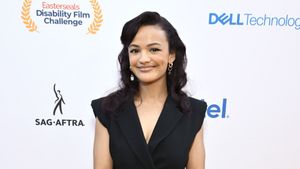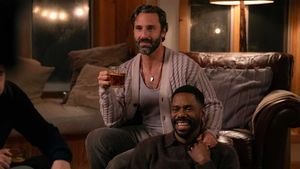Out on Netflix today, When They See Us shares the true story of the 1990 wrongful conviction of five Black boys coerced into confessing to the rape of a white woman in New York City. Be warned, the injustice of what happened to the Central Park Five will make you want to jump off your couch and fight your TV.
"It's like a magnifying glass on the world right now," Isis King, who plays Marci Wise in the series, told PRIDE, "and not just my part, but the whole story. The whole story is relevant to right now, which is the crazy part."
Korey Wise, played by Moonlight's Jharrel Jerome, was the oldest of the central park five. All were convicted, but while the younger four went to juvie, Wise, at 16 years old, went straight to prison. He was so entangled in the system that his friends and family didn't even know what prison he was in at several parts of his 11-year incarceration.
We see the full extent of Korey's heartbreaking story in episode four of the miniseries. To keep himself safe from other prisoners, Korey asked to be moved into solitary confinement. That's where he would daydream about his old life, and a flashback is how we meet his sister, Marci.

Marci was a mentor to her little brother, even before she transitioned. Marci gives Korey a hard time for skipping school. Marci steals his bag of chips. Korey notices when someone in the neighborhood hurls a "f****t" at Marci, but the two shrug it off like it's just the way things are.
Korey's daydreams are interrupted when the Warden calls him into his office to tell him about the death of his brother, Norman. Korey's eyes well with tears as he revisits his last memory of his sibling. Their mother Delores, played by the unusually serious Niecy Nash, kicks Marci out of the house for wanting to live her life as a woman. "Look at him," Delores yells, "You're a fucking joke." She calls Marci a demon and delivers a final blow ("At least I'm a real woman") as Marci storms out, the last time Korey will see his sister alive.
We don't get much more back story on Marci, except that she was later murdered.
"It's so relevant. Like nothing in my part seemed like it was in 1980," said King. "It's right now, too. It's sad because you would think it's so much more progression but I think so many people will be able to relate to it."
Three Black trans women were murdered in May alone. Muhlaysia Booker, Claire Legato, and Michelle Simone were just a few of the trans people killed in 2019. Little has changed in the decades since Marci died.
"At that moment when we filmed that, someone else had just been killed too," recalled King, "And I remember in that moment Ava [DuVernay, the film's director] saying, 'You can handle this however you want. You can present it however you want. Whatever's in your heart.' And she kind of gave me that space to do that."
As Wise breaks down in the arms of a correctional officer over his sister's death, Marci's spirit stands in the corner of the room, tears welling in her eyes. "I just thought that if I came back as an angel, and I saw my little brother in that moment," recalled King, "I wanted him to know that I was okay."
DuVernay, who handpicked King for the role, made it a point to include Marci's heartbreaking story in the eleventh hour of the miniseries, as well as find a transgender actor to authentically tell her truth.
King talked to some of Marci's friends and family to get an idea of who she was. "I didn't really know much about her but, it seemed like she was really loved in the community by her peers, and she really stepped out and did her own thing."
"And unfortunately, we have to get better with supporting black trans women. Black trans women are still being killed at a crazy rate. And we still don't really have the support outside of the trans community that we need to really bring this to the light or bring awareness to it."

King was proud to tell Marci's story and she believes it really has the potential to change lives in the black community. "Her story is so important because she really affected her brother's life," she said. "And I just want people to see that trans women, especially trans women, especially black trans women and trans women of color, matter. Our lives matter. We do and can impact this world and we are amazing people and we just need the platform and the safety to do so. And support from our families and friends really do make a difference. We should be able to live long, healthy lives too. The average lifespan of a black trans woman shouldn't be 35. So if that means more awareness and family stepping in there to really protect their children then I hope that is accomplished."
When They See Us centers on these five black boys, but transgender people are our sisters and brothers and aunts and uncles. "The fact that it's included and the project is not LGBT, I think that is important for it to maybe mirror some of what people would see in their own households. And maybe will help them to deal with the transphobia that might be in the household. Like, oh, wow, I see me in that. Like, oh wow, maybe I treat my child like that and this could happen, unfortunately. Maybe I need to support my child more," King pointed out.
"And if that message of awareness and love can be spread throughout the community, especially the community of color, I think it will definitely make a big difference since black trans women have the highest suicide rate, murder rate, all of these things, if your family was just there to support you more you didn't have to resort to surviving on the street, I think things would be a lot different. Definitely."
Things have to change. Our family is dying. Protect Black trans women.
When They See Us in on Netflix now. Watch the trailer below:
![]()
![]()
![]()
![]()

































































































































